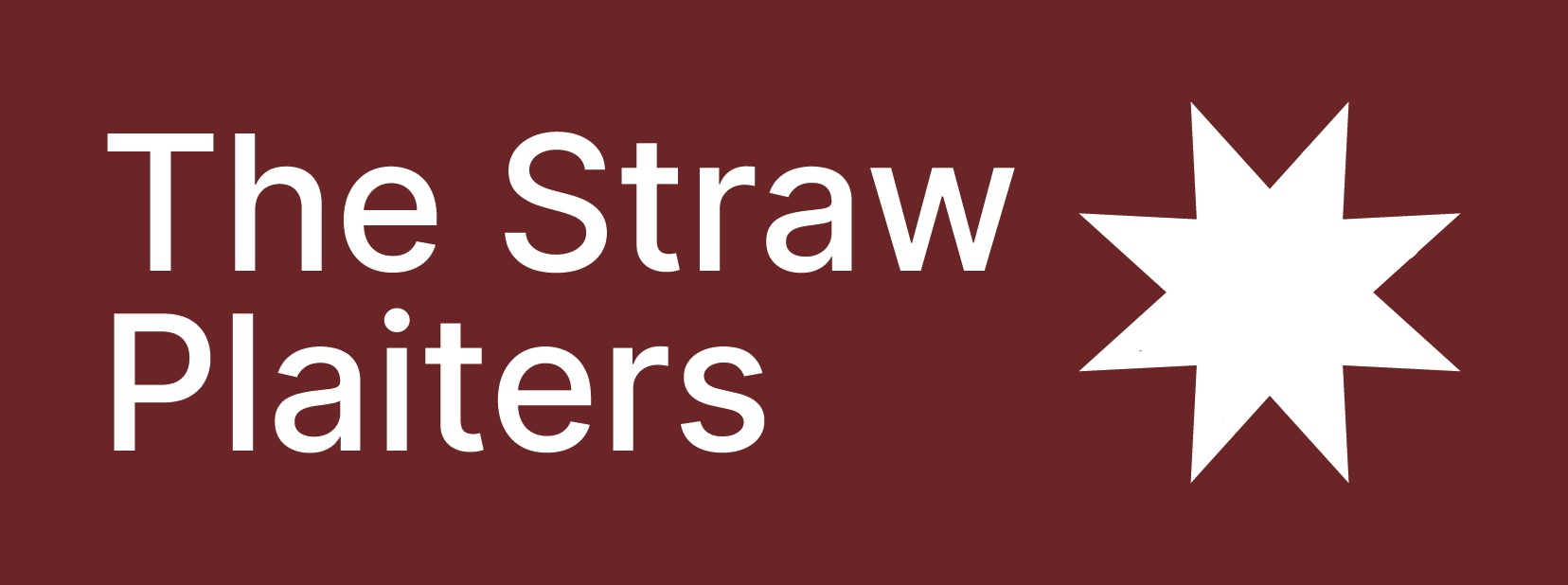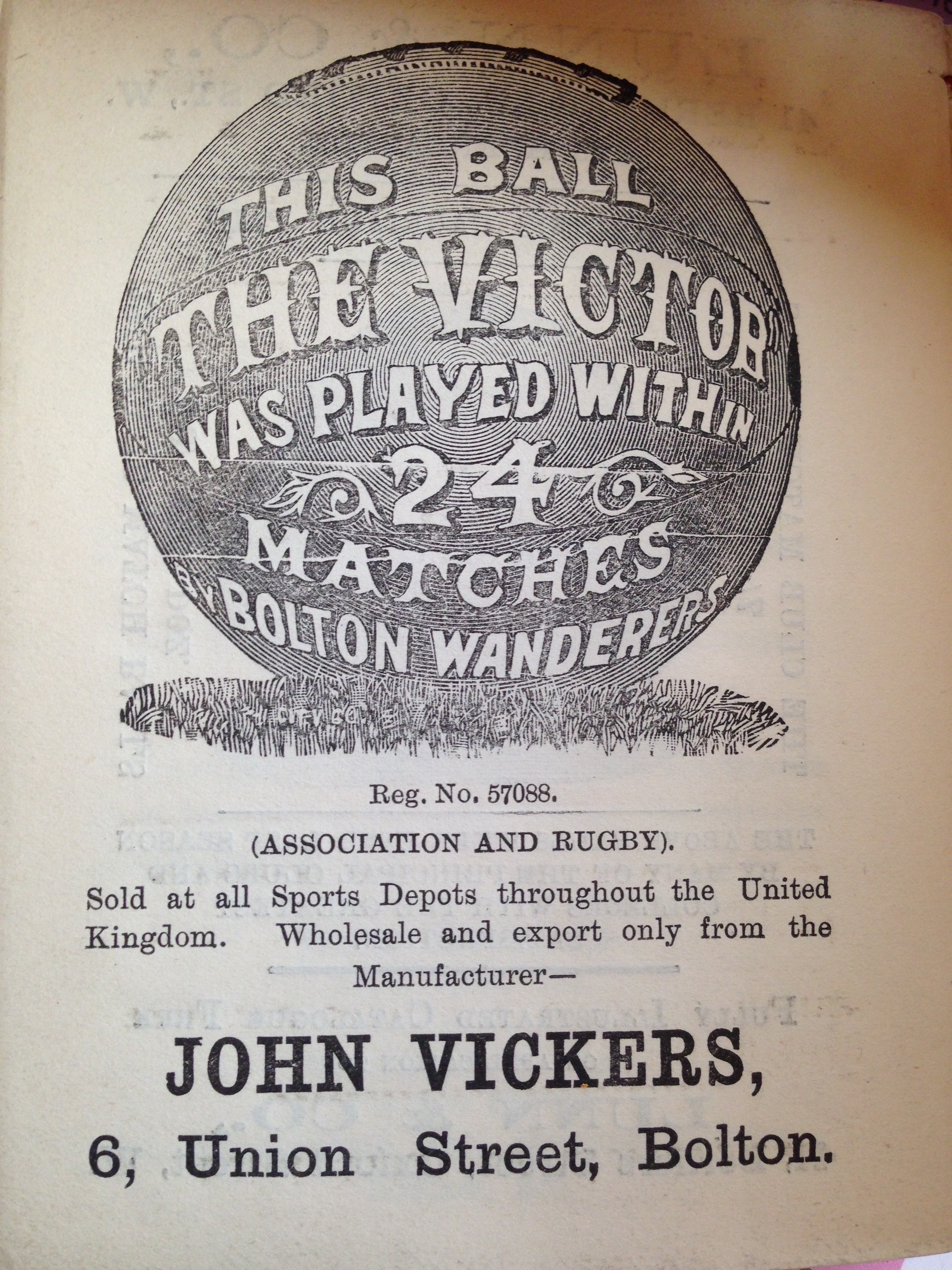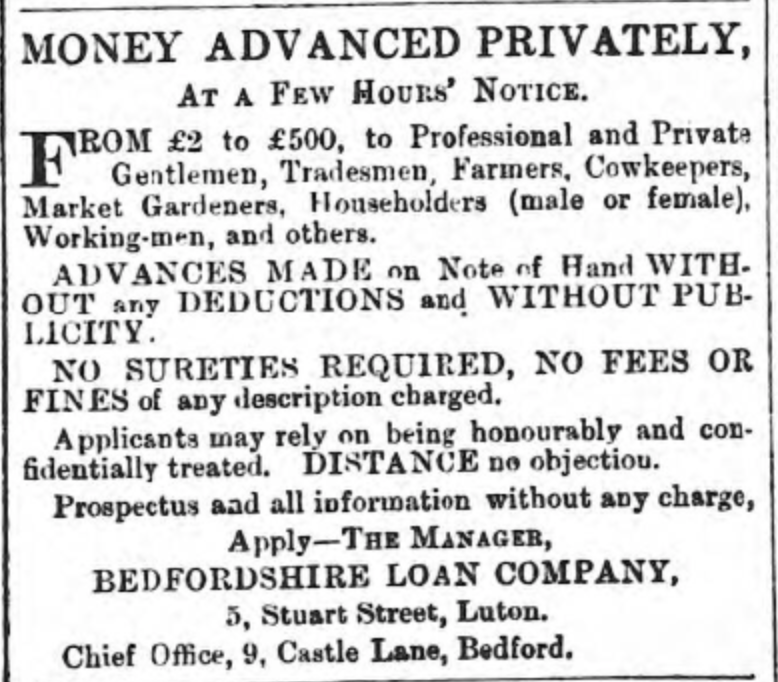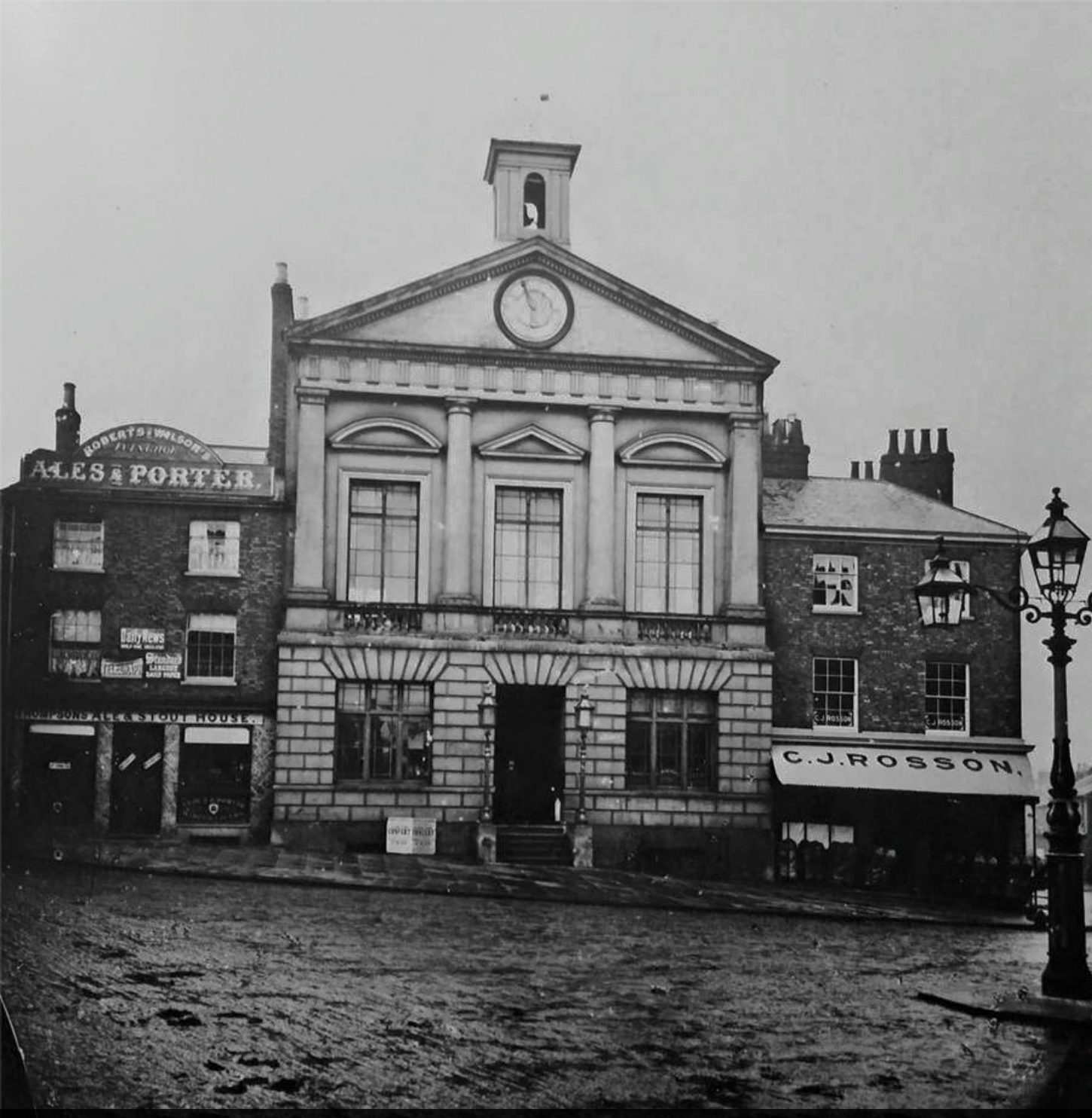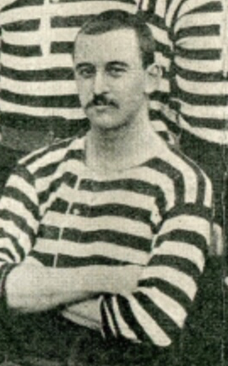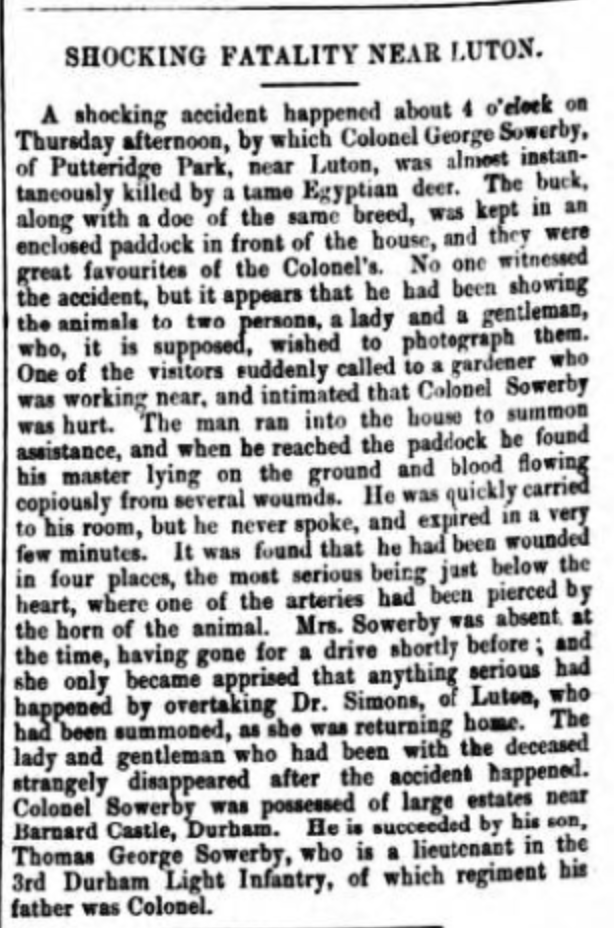Chapter 15 – Slow progress – Spring 1888
Page 1 – Luton Town v Hanover United
Page 2 – Luton Town v St. John’s College
Page 3 – Luton Town v Grosvenor, Old St. Paul’s and Limehouse
Page 4 – Luton Town v Bedford and Bowes Park
Page 5 – Easter, v Clapton, Hanover, London Scottish United and Woodville
Page 6 – Luton Town v London Caledonians and Old St. Paul’s
Page 7 – AGM, Summary and preparations for the new season
If you want to read the Luton Town match reports only then look for the pink and dark blue kits. Anything within a square bracket is my comment, usually a clarification. The newspaper articles are from the Luton Reporter unless stated otherwise.
1888 is probably known by most as the year Jack the Ripper struck four times in August and September. Other suspected murders occurred from 3rd April 1888 until 1891. This puts a marker on the times when the Straw Plaiters were struggling to make their name in football. They had arranged fixtures against many top London clubs and results were on the whole, disappointing.
On 7th January 1888 the first team travelled to Wimbledon to play their old friends, Hanover United. The Luton Reporter;
“The Luton Town Club also played the Hanover United on Saturday at Wimbledon. A stubborn resistance was was shown by both teams. The ground was in bad condition, which made harder work still of it. The home team were prepared with a home eleven and meant to give their opponents a good dressing. The Luton players proved, however, that Jack was as good as his master, and set to work with H. Hills as “sub” in place of Smart (who, we regret, retires by medical advice from football for the rest of the season), and this coupled with a weak companion of the left wing reduced to below par, the powers of the forwards. This told so heavily against Luton that by the finish of the game both J.C. Lomax and G. Deacon had had enough of it. However, the visitors were the first to score, lowering the Hanover United colours during the first half of the game. Several times a foul ought to have been claimed by J.C. Lomax, but his generous disposition forbade him noticing it. The good tackling of the half-backs was the mainstay of the game. Barrett received some nasty scratches and Reade was nearly puffed out. But notwithstanding this the plucky Lutonians played up in creditable style and not until the game was advanced in the second half, did their opponents obtain a goal. Many times the ball, as if it were influenced by Fate against Luton, passed by the posts. The welcome call of time at last came, and the besmeared players after a hot contest made a drawn game of it – one goal each. Team for Luton: Mileman, goal; Sanders and Blow, backs; Moody, Barrett and Reade, half-backs; E. H Lomax, J.C. Lomax, Blow, G. Deacon and H. Hills, forwards”.
Yet another game when players have not turned up and a substitute had to be found. I have not seen one player named Blow before let alone two. I believe that the Blow’s are friends of J.C. Lomax from Cambridge.
Note also the reference to J.C. Lomax being repeatedly fouled but playing on. At this time a free kick was only awarded if appealed for.
I have found a report from the in-house magazine “Home Tidings” of The Polytechnic, Young Men’s Christian Institute, 309 Regent Street, London dated 14th January 1888;
“Polytechnic First XI v Luton Town
This match was played on Saturday, January 7th at Merton Hall, Wimbledon, and resulted, after 80 minutes’ play, in a draw – one goal each.
The game was a bit slow at starting; however, as the match advanced, the play became much faster. In the first half the play was fairly even, and Pledger made a capital shot at goal, which hit the bar and bundles into play. No score was made, as the ball was kicked behind. Just before the call of half-time a combined rush by the Luton forwards brought the ball close to our goal, where a scrimmage took place, and Lomax succeeded in kicking a goal for Luton.
In the second half our players did all the pressing, and Charlie Stanning, by a splendid shot, was able to equalise the score. Our players continued to have the best of the match until five minutes before time, when the Luton forwards rushed down the field, and Roberton, who was keeping goal, had to save twice. The ball was got away, and when time was called the play was in the centre of the ground. Waltham at back and Newman at half-back justified their selection; the latter played forward on the right with Stanning in the second half and did very well. Besides those mentioned, Turk, Stanning and Gambles played well, though the former was somewhat selfish in the second half.
Polytechnic – W. Potter, goal; E.C. Ravani (Captain) and W. Waltham, backs; L. Harris, W.G.Adams and J. Newman, half-backs. A. Roberton, C. Stanning, G.W. Turk, Gambles and E.C. Pledger, forwards. Umpire, W. Tipton.”
The Luton Times gives a report of the Reserves match against Victoria Rangers, a local Luton team.
“The turf was rather loose and sticky, especially in front of the goals, making accurate play impossible, and a strong wind was blowing across the ground keeping the play all on one side. The match was stubbornly contested throughout, although the town team had the best of it, and pressed their opponents considerably during the first half, and the score no doubt would have been heavier but for the good play of the Rangers goalkeeper. Spratley scored the first goal in about ten minutes from the start, and Brookes followed up with another a little while after. The Rangers had several chances to score, but lost them, and a very good and pleasant game ended in a win for the Town Club by two goals to nil. The town team was as follows:- J. Smith, goal; J.G. Hunt and F. King, backs; A. Wright, W.Hills and Monroe, halves; W. Miller, H. Boxford, H. Spratley, T. Brookes and Ellingham, forwards. W. Carter, umpire”.
__________________________________________
Page 2
January 10th committee meeting resolved that
“3 pairs of shin guards be purchased of Mr Spratley at 1/9 per pair”.
Clubs were not allowed to buy kit for amateur players so this purchase was an act of professionalism. Amateurs were expected to buy their own kit. The three players would have had to be registered as professionals in order to receive the shin pads.
The club minute book shows that at this time J.C. Lomax wrote to the committee every week presumably about team selection. He had left Cambridge University at Christmas 1887 without any qualification. He may have been living with his father in Grosvenor Square, London. E.H. Lomax had left University with a B.A. and there is an indication he joined Inner Temple, which could mean he was a trainee barrister.
The game against Ilford on 14th January was cancelled due to
“a disputed point in a cup tie contest, the Ilford football team were unable to pay a visit to Luton on Saturday”.
J.C., E.H. and D.A.N. Lomax took the opportunity to go to play for St. Albans.
Interlude – The Luton Town Cricket Club met in January to elect their office bearers. There are some familiar names on the committee who were also involved in the Town Football Club, The Kershaw family had three members on the committee, A. Kershaw, J.C. Kershaw and W.H. Kershaw. T. Hill, O. Small, G.H. Small, S. Pakes, J.G. Hunt and J. Long were also at the meeting.
The 21st January saw another game against St. John’s College past and present pupils.
“The College, though obliged to play three substitutes, had the stronger of the two elevens. The play was very even in the first half of the game, but in the second half, the College team had everything their own way, and won a good game by four goals to two. The goals were kicked by Small 1 and King 1, Narburgh 2, D.A.N. Lomax 1 and Jones 1. The teams were as follows: Luton Town – T. Smith (goal), T. King and A. Sanders (backs), W. Barrett,, T. Read and F. Moody (half-backs), B. Smith, G.H. Small (right), H.G. Spratley (centre) and G. Deacon and E. Ellingham (left, forwards). St. John’s College – Boxford (goal), E.H. Lomax and D.A.N. Lomax (backs), H.A. Gibbs, G. Garrett and F. van Heyst (half backs), Miller and E.T. Jones (right), J.C. Lomax (centre), J.B. Furlong and L. Narburgh (left, forwards).”
That was indeed a strong College team and the Town, without the Lomax brothers, were always weaker.
The Luton Times has a longer report.
“On Saturday a football match was played on the ground in the Dallow-lane between the Luton Town Football Club and an Eleven representing St. John’s College, Past and Present. Unfortunately, the latter were short in numbers and had to put three substitutes in the field. The weather was very unfavourable, rain having fallen heavily during the whole morning, and this may account for the small number of spectators who witnessed the contest. The Town having won the toss, chose to play with the wind. Lomax soon started the ball, and a very good game followed. During the first half the play was very even, though the wind proved to be a substantial help to the town team. Narburgh scored first for the College, the ball having been very well passed down the field. In pretty quick succession two goals were scored by the Lutonians, Small and King obtaining these points. After half-time a complete change came over the game. The College goal-keeper and backs, who had a good deal to do before, now got a comparatively easy time of it. With very little exception the play took place in the town quarters. A place kick by D.A.N. Lomax brought the ball under the bar, and the goal-keeper touching the leather a second goal for the College was the result. This was soon followed by a third, Jones sending the ball between the posts by a neat shot from the right. Once more Narburgh got possession of the ball, and by a capital run and a very fast shot added one more goal to the College total. This proved to be the last point scored by either side and this very pleasant and satisfactory game therefore resulted in favour of St. John’s by 4 goals to 2”.
INTERLUDE – St. John’s was not the only college in Luton trying to attract the children of the middle class. Grosvenor College placed adverts at this time;
“Grosvenor College, High School for Boys, Rothesay Road, Luton. Principal Mr J.E. Arnold, assisted by an efficient staff of Resident English and Foreign Masters. The pupils of this establishment will re-assemble for the Easter term on Wednesday January 18th, 1888. Vacancies for Borders and Day Pupils. Terms moderate. For Prospectus apply to the Principal”.
There was also a “Young Ladies’ College” at Park Square which was also taking boarders and day pupils. Mrs Sawyer was the Principal.
________________________________________
Page 3
The last Saturday in January saw another game without the Lomax brothers,
“On Saturday in the Dallow-lane grounds, a pleasant game was played between eleven of the Luton Town and London Grosvenor Clubs. Beginning with wind in their favour the Town players took all the advantage it afforded and a very short time Boxford scored the first goal from a corner. This was followed by well directed shots from Deacon, Reade and Barrett, and Small also put in a good ball from a corner-kick, but all to no purpose. Before half-time, however, a second goal was obtained by Taylor, who kicked a fine ball to goal, which, off Deacon’s back, went through the posts. The Grosvenor goal-keeper just touched it, but could not reach as far to stop it. Nothing further was scored throughout the game, the local men having it pretty much their own way. This fact was chiefly due to the extraordinary strength of the half-backs, who were also aided by the specially good play of the backs. The Grosvenor team played very creditably, having amongst them a Preston North-end reserve man. The game ended in favour of Luton, two goals to none. Luton team; Mileman, goal; Moody and King, backs; Taylor, Barrett and Reade, half backs; Small, Boxford, Spratley, Deacon and Hills, forwards.”
The 4th February 1888 saw the Town play Old St. Paul’s.
“The Town Club played their twenty sixth match of the season in the Dallow-lane grounds on Saturday with the Old St. Paul’s, and although the Town Club were defeated, they figure well thus far, having won thirteen, drawn five and lost eight. The visiting team scored the first goal ten minutes after the start. The Town half-backs and forwards made many a try to score, showing at times exceedingly pretty play. T. Small and Narburgh played well together, the latter being deservedly cheered by the spectators. J.C. Lomax and Deacon getting hold of the ball worked it up to goal, and when the keeper rushed out to save he fell on all fours and a regular piece of “Rugby” ensued. The sphere was worked from under him, and instantly put between the posts. This equalised matters. On sides being changed, the game became more exciting. The strangers’ forwards frequently evading the Town’s backs brought to light some really first class goal-keeping up – their grand passing and shots at the goal. Meanwhile the Luton forwards constantly harassed the visitors’ backs by good combined play, Deacon making splendid efforts to score. Once the ball, striking the corner of the goal, fell just behind. At this juncture of the game Narburgh again several times exhibited a wonderful style of dribbling. Luton essayed hard to score but made bad use of their last chance in a corner kick, Read putting the ball at the back of the goal. This brought the game within five minutes of the close. The ball was kicked from goal, when the old St. Paul’s right wing ran it up, and quickly put it to centre, from whence it was shot to goal; and a well earned victory feel to the visitors. Luton team: Mileman, goal; Sanders and King, backs; Reade, Moody and Barrett, half backs; E.H. Lomax, G. Deacon, J.C. Lomax, Narburgh and T. Small, forwards.”
On 11th February they played Limehouse again.
“Teams Representing these clubs played in Luton on Saturday. The ground was quite unfit to play upon, and materially helped to retard the spirit of the game, but the visitors managed to score two goals to none, their right-wing and centre forward playing well. The same might be said of their backs, who often saved their citadel from the frequent attacks of their opponents. Luton Town v Bedford will not be played on account of the weather”.
There was heavy snow on the night of the 13th/14th February and it snowed every day for ten days. A slight thaw gave football some hope but more snow at the start of March meant 11 inches had fallen in total. Travel was difficult and pitches unplayable and it was not until the 10th March that the Town would finally play Bedford.
_____________________________________
Page 4
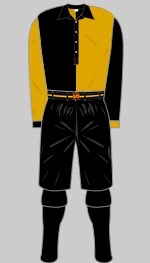 “A match between Luton Town and Bedford clubs was played in Dallow-lane ground on Saturday, when Luton were the victors by three goals to one. The visitors displayed no special abilities, Taylor (half-back) captain, A.J. Smith goal-keeper, and a left-wing man – who scored by a splendid shot from a corner-kick – did best service for their team. The Town Club played their best passing game of the season, the first goal being off a ball from Deacon from the touch-line, well centred, and headed through by Smith, whilst the second was obtained by Furlong. The ball was actually through when Deacon headed it further in. Several well-placed balls by J.C. and E.H. Lomax just passed over the rails, and when half-time was called the game stood two goals to none in favour of Luton. The Bedford team then pulled themselves together, but Deacon getting the ball made a brilliant run down the field and put it through the posts, and was much applauded for his smartness. Soon after this the opponents scored, and the game ended as stated. The Luton team was:- Mileman, goal; Moody and Hyde, backs; Reade, Barrett and Wright, half backs; E.H. Lomax and Deacon, right wing: J.C. Lomax, centre; Furlong and Smith, left wing”.
“A match between Luton Town and Bedford clubs was played in Dallow-lane ground on Saturday, when Luton were the victors by three goals to one. The visitors displayed no special abilities, Taylor (half-back) captain, A.J. Smith goal-keeper, and a left-wing man – who scored by a splendid shot from a corner-kick – did best service for their team. The Town Club played their best passing game of the season, the first goal being off a ball from Deacon from the touch-line, well centred, and headed through by Smith, whilst the second was obtained by Furlong. The ball was actually through when Deacon headed it further in. Several well-placed balls by J.C. and E.H. Lomax just passed over the rails, and when half-time was called the game stood two goals to none in favour of Luton. The Bedford team then pulled themselves together, but Deacon getting the ball made a brilliant run down the field and put it through the posts, and was much applauded for his smartness. Soon after this the opponents scored, and the game ended as stated. The Luton team was:- Mileman, goal; Moody and Hyde, backs; Reade, Barrett and Wright, half backs; E.H. Lomax and Deacon, right wing: J.C. Lomax, centre; Furlong and Smith, left wing”.
The Luton Times says that;
“it was a fine warm afternoon, and a very enjoyable game took place, both teams playing up well, but the Luton forwards were the best of the two teams. The home team kicked off and pressed their opponents at once, several shots being sent in the first few moments, but the players, who had none of them played recently owing to the ground being covered with snow, were sometime before they managed to score. Charlie Lomax and also Ernest had several chances to score, but missed them unaccountably. At last, however, the ball was sent in from the left, and Smith passed it to Deacon, who muffed the goalkeeper and put the ball through, which was followed by another from E. Lomax. Shortly after with the teams crossed over with the game two nil in the favour of Luton. Bedford now, with the advantage of the wind and sun, made several attempts to score, which at last succeeded from a corner by Taylor. A good piece of play was now witnessed. Deacon obtained possession of the ball and eluded the backs and shot the third goal for Luton, and the last one of the game, the whistle blowing for time, leaving Luton victorious by 3 goals to 1”.
Not the best reports but I have reproduced them both word for word.
The Luton Reporter says Smith, Furlong and Deacon scored. The Luton Times says Deacon, E.H. Lomax and Deacon scored. I will go with the Luton Reporter scorers as they had more experience of reporting games, and therefore knowledge of the players, than the Times. J.C. and E.H. Lomax played two midweek games for St. Albans on the 7th and 14th March.
The F.A. Cup Final on the 24th March 1888 saw West Brom beat Preston North End 2 1. The day before a meeting of some of the leading clubs in the country set out a blueprint for the Football League. The League would be formed later in 1888 made up of 6 north western clubs and 6 midlands clubs. Luton Town were a long way off achieving League status.
The Saturday of the F.A. Cup Final saw another home match for the Straw Plaiters.
“A match between Bowes Park and the Luton Town clubs was played at the Dallow-lane ground last Saturday, and despite a bitterly cold wind a good game was witnessed, resulting in a win for Luton (Deacon two, E.H. Lomax one, J.C. Lomax one) four goals to none. The players for the Town were:- Mileman, goal; Saunders and King, backs: Read, Barrett and Moody, half backs; Deacon, E.H. Lomax, J.C. Lomax (centre): Spratley and G. Smith, forwards.”
Interlude – With the Easter Holidays approaching the Luton Times gave a review of the general entertainment on offer in the town.
“The Easter Monday fixtures for Luton are legion. The chief event is a bazaar at the Town Hall, on behalf of the building fund for providing a new lecture hall and new Sunday-school buildings in connection with the Union chapel. Albert-road Wesleyan chapel also holds a bazaar, and the Hightown Primitive Methodists continue from Sunday their Sunday school anniversary. At all these Mr Cyril Flowers M.P., is to appear. There is also a promenade concert, a masquerade ball, football matches etc. Cheap excursions run to London, Bedford, and there are Cook’s continental trips. Given fine weather, and pockets full of money, the people may enjoy themselves in various ways”.
_____________________________________
Page 5
The Town would play four games over Easter, on Good Friday, Saturday 31st March, Easter Monday morning and afternoon. The first was against Clapton.
“The Town Club have been busy during the holidays. They have played several matches, starting on good Friday with an encounter with the Clapton. Pressure on our space obliges us to curtail our reports. By some smart passing the visitors got the ball near to the goal, and it was rushed through. The leather was then closely brought down the field by J.C. Lomax, Narburgh, Deacon and Smith for Luton in a fine passing style, and it was shot through almost before their opponents knew where they were. Matters thus equalised Luton made an effort to score again and several corners fell to them, but up to half time the game was mostly in the Luton ground. On resuming play the Clapton showed considerable signs of superior strength and skill, and in a short time they again rushed it through. The home team which plenty of pluck made some rattling attempts after this to score, but despite their repeated efforts the game finished in favour of Clapton, two goals to one. Players: Mileman, King and Humphrey, backs; Reade, Barrett and Wright, half backs; Spratley, Deacon, J.C. Lomax, centre: Narburg and Smith, forwards”.
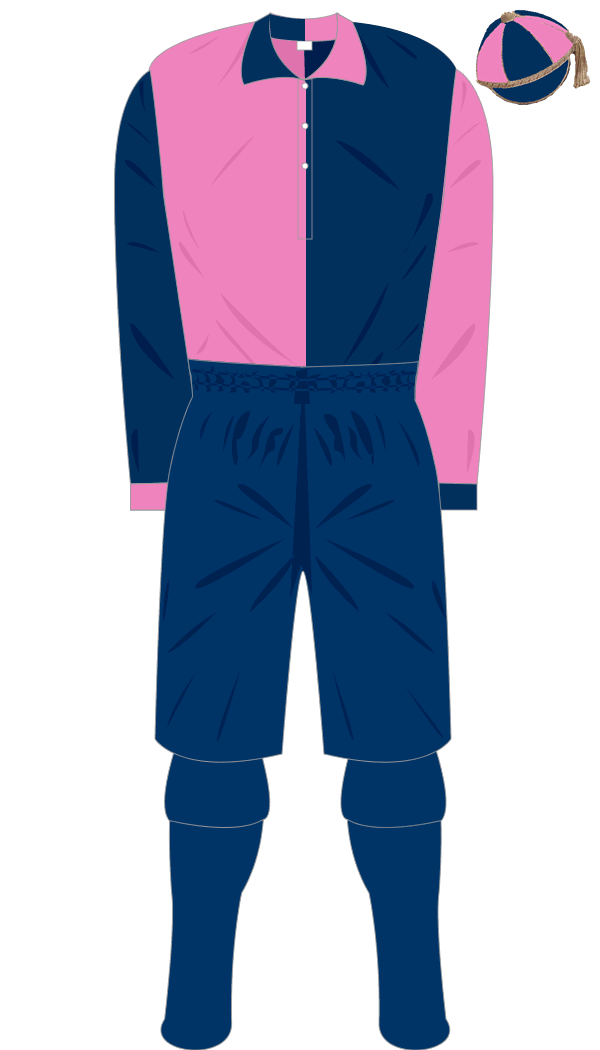
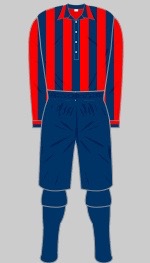 “Hanover United v Luton Town. This match was played on Saturday. The first goal was scored by the Town. Give and take play followed for both teams after which, by good combined play among the forwards, Smith headed the ball through the posts. A protest was made, but the appeal was sustained. The efforts of the visitors to score were frustrated by the irresistible play of both half-backs and backs. J.C. Lomax here made a fine run down the field, taking himself with the ball clean through the goal. After half-time Luton continued to have much the best of the play, the forwards playing first class. H. Hill and Reade tackling their opponents in good style. The next and fourth goal was obtained by Smart, just in front of the post. Nothing further was gained, and the game ended after a good contest in favour of Luton, four to none. Team: Mileman, goal; King and Sanders, backs; Reade Barrett and Moody, half-backs; G. Deacon, H. Hills, J.C. Lomax, Smart and Smith, forwards”.
“Hanover United v Luton Town. This match was played on Saturday. The first goal was scored by the Town. Give and take play followed for both teams after which, by good combined play among the forwards, Smith headed the ball through the posts. A protest was made, but the appeal was sustained. The efforts of the visitors to score were frustrated by the irresistible play of both half-backs and backs. J.C. Lomax here made a fine run down the field, taking himself with the ball clean through the goal. After half-time Luton continued to have much the best of the play, the forwards playing first class. H. Hill and Reade tackling their opponents in good style. The next and fourth goal was obtained by Smart, just in front of the post. Nothing further was gained, and the game ended after a good contest in favour of Luton, four to none. Team: Mileman, goal; King and Sanders, backs; Reade Barrett and Moody, half-backs; G. Deacon, H. Hills, J.C. Lomax, Smart and Smith, forwards”.
It is a poor report and it confirms what we had thought, that reports were altered by the newspapers to suit the space they had. We have seen “give and take play” used time and again and this seem very much to have been an editorial phrase when cutting down details in the report. I also wonder if they changed some of the football language used to suit their wider readers. Who knows what interesting clips ended up on the cutting room floor – shirt colours, badge details, descriptions of the Dallow Lane ground, the pitch markings and so on. On the plus side the newspapers give the team line up more often.
From the in house publication “The Polytechnic Magazine” of The Polytechnic, Young Men’s Christian Institute, 309 Regent Street, London dated 5th April 1888
“P.A.C. v Luton. This match was played at Luton on Saturday last, and resulted in a victory for the home team by 4 goals to love. One of the points scored was undoubtedly offside, and was given as such by our umpire; the Luton official, however, who bye-the-bye, was a long distance off, thought otherwise, so rather than endanger the pleasantness of the game, we gave in. Owing to various causes, such as holidays, etc., the team representing the Poly may be described as a very scratch lot. P.A.C. :- Fred Hutt, goal; W. Atkinson and Offord, backs; A.W. Roberton, Len Harris (captain) and Sun number 1, half backs; C.E. Pledger, Sub number 2, C. Stanning, J. Ware and P. Dakin, forwards.”
“Luton Town v London Scottish United. A short but fairly contested game came off between the above teams on Easter Monday. The wind interfered considerably with the play. In ten minutes from the start Spratley made the first goal, and in twenty minutes he scored a second time. The backs, Hay and Humphrey sent the leather to the forwards in good style. Pedrick repeatedly brought the ball well well up and centred close to goal, when at last it was put through the posts, thus making the third goal. The visitors made occasional runs but the ball was chiefly on their own ground, and before half-time the Town had scored four goals. But during the second half of play, the tables were turned. The Scottish began to play a better game, and by fair passing made their first goal, which was quickly followed by another, the whole team passing well, and the forwards right and left keeping their places. Five minutes before time they added a third goal. The home team not showed symptoms of weakness, and, indeed, seemed to have had enough of it. The Town eleven were left the victors, four goals to three. Luton team: Mildman, goal; Hay and Humphrey, Backs; Wright Moody and Hill, half-backs; Spacey, Pedrick, Spratley, Miller and Boxford, forwards”.
That was the Town’s second team.
“Woodville v Luton. This match was thought to be the best of the series of four, and ended with the Town Club team scoring two goals to none. The Town team in ten minutes had scored, the forwards surrounding the mouth of the goal and by well judged kick shooting the sphere through the uprights. A lot of give and take work followed, but the respective goal keepers were equal to all the assaults that were made, King’s play being remarkably clean and sure. Half-time found Luton one goal to none. On play being re-commenced the visitors secured one or two corners but a way was opened up for J.C. Lomax, Deacon and Hill to take the ball down, and though hardly pressed by the Woodville half-backs, the ball was passed to the left wing, Smart centred it, and Smith rushed forward and shot it through the goal. After that, Taylor for Luton twice shot the ball to goal (once striking the rail and falling over over the other side). The visitors, however, continued to put in some stiff play, and eventually their backs shooting the ball across to the right wing, it was taken up and passed through, but as it was fairly off side, the points was disallowed. Luton team: J. Mileman, goal; Saunders and King, backs; Taylor, Barrett and Reade, half-backs; Deacon and H. Hills, right wing; J.C. Lomax, centre; Smart and Smith, left wing”.
On the following Tuesday the Town beat Engineers of Luton nine goals to one. This was a reserve game and there was no match report.
_______________________________________
Page 6
The 3rd April 1888 committee meeting resolved
“that Messrs Pitkin and Shane should see Mr Rudd about a tea for Saturday April 14th and arrange”.
The 7th April the Luton Reporter;
“One of the smartest teams which have visited Luton this season were the London Caledonians, who played the Town Club on their own ground on Saturday. From their first appearance they were looked upon as the victors, and when it was found that the Luton Town eleven were playing four substitutes, the question was at once settled. The home team, however, played up well, and but for some really hard luck would probably have made a drawn game of it. As it was, the result of play was two goals to none. Luton played – Mileman, goal; King and Sanders, backs; Taylor Barrett and Munro, half backs; Deacon, Hill, Boxford, Miller and Pedrick, forwards”.
Four substitutes was exceptional but nonetheless it must have been irritating and embarrassing for the committee. A prestigious London team had come to play in the town and four players do not turn up. The other team members must have been frustrated and the crowd might have felt short changed. The credibility of the club was at stake when these thing happened.
The club minute book for the 10th April 1888 reads;
“Mr Shane and Mr Pitkin reported as to their visit to Mr Rudd. Mr Shane stated the question of price who depend upon how many were provided for. If 40 there would be a charge of 7/6 for the room, if 50 no charge for the room and under all circumstances the club must find their own piano. After discussion it was agreed that we should guarantee 50 to Mr Rudd and that the committee should hold a meeting on Thursday night at 8.30 P.M. in order to ascertain how many would be likely to be present.
Also on 10th April that;
“Messrs Shane and Pitkin be auditors for season 87 and 8”.
Finally it was resolved that
“the annual general meeting be called for Saturday April 21st 1888 in the Council Chamber Town Hall.”
The 14th April saw
“another London team make the trip up from St. Pancras. The Luton Town Club played their last match for the season on Saturday at the Dallow Lane ground with Old Saint Paul’s. This Club played their strongest team, and the result of the game showed their capabilities. The London Club did not put their best eleven in the field several of the members being at the last moment unable to join in the game. The first goal was scored two minutes after the start which was followed by some splendid shots just over the rail, and in fifteen minutes another goal was added. The Town then experienced hard luck, as two fine shots by H. Hill caused the visitors goal keeper to handle the ball sharply, and the forwards being upon him in a moment they almost gained a point. Several corners fell to their opponents, and these being well put in caused the Town much anxiety. Some good play was shown by the forwards of the home team, and a corner was obtained, but without anything resulting from it. After this the ball was sent out from goal to right wing, and put to half backs, from which the leather by a tremendous kick went spinning through the Town goal. Thus before half time the Old Saint Paul’s had made three goals, whereas the Luton men had failed to score at all. On the game being resumed some even play took place, but the Londoners working admirably together got hold of the ball and took it in front of goal and shot it past Mileman, making the fourth goal. These tactics were repeated and by this means the visitors scored for the 5th time. But meanwhile Mileman, being badly pressed, saved his goal in good style. Nothing further occurred, and thus the game ended in defeat of the home team by five goals to nil. The Luton team were – Mileman, goal; Sanders and Hoy, backs; Taylor, Barrett and Reade; Narburgh, J.C. Lomax, E.H. Lomax, G. Deacon and H. Hill, forwards”.
As awful result to end a disappointing season but in typical British style, a nice tea cures all as reported by the Luton Reporter;
“Luton Town Football Club. – This club brought the seasons play to an end on Saturday, and the opportunity was taken by the committee to invite members to a knife and fork tea at Rudd’s Rooms in Bute Street, to which about 60 responded including the visiting team viz., Old St. Paul’s. The manner in which Mr Rudd catered for the company gave general satisfaction. After tea a very pleasant evening was spent, a smoking concert, under the presidency of Mr J.C. Lomax, being very successful. The following programme was gone through:- Pianoforte solo, Mr Baker; song, “Blind boy at play”, Mr G Smith; song, “Bill of fare”, Mr Wilson, London; song, “Wolf,” Mr Clark; song, “Selected”, Mr Taylor, London; song, “I really can’t keep still”, Mr J.C. Lomax; song, “Wrong Un’s”, Mr H Shane; song, “I went with him”, Mr C Randall; song, “Old Brigade”, Mr Hunt; song, Last, last man”, Mr Nolleth, London; song, Masher king of Piccadilly”, Mr Wilson, London; song, “Veteran”, Mr Bennett; song, “So it was”, Mr Rally; song, “Hear it”, Mr C Randall; song, “Love”, Mr Squires, London; recitation, Mr Lindsay, London; song, “Hearts of oak”, Mr G Brown; song, Christening”, Mr Nolleth; song, “I couldn’t”, Mr C Randall; song, Maid of the mill”, Mr G Smith; song, “Near it”, Mr C Randall; song, “Anchored”, Mr Clark; God save the Queen”.
Smoking Concerts, photo below, were men only affairs, with or without alcohol. It was a chance to chat, tell stories and have a good old sing song. Victorians had to “make their own own entertainment” as the saying goes. Most members of a family would learn a song or two, a story, poem or an instrument so that they could take their turn at gatherings. I would guess that shyness would not be an issue as most had trotted out their ditty many times over the years. Smoking Concerts could also be fund raisers with an admission fee and professional acts brought in to entertain the gathering.
The following committee meeting on 17th April 1888 gave a
“Report of the tea and concert was given and was considered most satisfactory”.
The Annual General Meeting was
“deferred to April the 28th so as not to clash with meeting of Athletic Society and also to allow for all of our own Committee men to be present, several of who were engaged out of two on the 21st”.
_________________________________
Page 7
28th April 1888 saw the Annual General Meeting at the Town Hall, photo above;
“The annual general meeting of this club was held at the Council Chamber at the Town Hall on Saturday evening. The chair was occupied by Mr F. Pitkin. The Hon. Secretary read the annual report, which was passed. The next business being to elect a President and Vice-Presidents, the former post was with acclamation conferred upon Mr John Lomax, sen [senior], who has held the office ever since the Club was formed. The Vice-Presidents elected were :- Mr Cyril Flower M.P., Mr F. Ewen, Mr J.C. Kershaw, Mr A.T. Sworder, Mr R. Ford, Mr C. Plummer, Mr R. Ordish, Mr S. Mayles, Mr J.I. Wright, Mr H.T. Shackleton, the Mayor and Mr John Cotchin. Mr J.G. Hunt, who has held the post for two or three seasons, was re-elected Treasurer. The post of Hon. Secretary fell with one accord to the indefatigable Mr Isaac Smith, whose good judgment and care was universally testified to, while Mr William Wheeler was again appointed his assistant. The committee for the ensuing year was chosen as follows:- Messrs A.J. Steabben, W. Robinson, H. Spratley, W. Carter, J.B. Furlong, H. Shane, – Evans, G. Deacon, W. Miller, F. Pitkin, F. Scott, J. Bennett and F. Hill. During the season the club has lost 9 matches, drawn 6 and won 21. In the above matches 86 goals were scored to the credit of the Club and 60 against. A word of praise, it was felt, should be given to Mr Steabben and Mr Shane for their interest in the Club during the season. Subjoined is the balance sheet:- Receipts: To balance £4 8s 10d; to donation (Mr J. Lomax) £2 2s; to donation (Mr Cyril Flower M.P.) £1 1s; to members’ subscriptions £17 15s 5d; to takings at gate, £50 4s 2d; total £77 11s 11d. Expenditure: By hire of meadow, £10; by ground expenses, £8 4s 2d: by subscription to English Association, 10s 6d; by subscription to Cup Competition, 10s, by committee and dressing room, £3 8s 3d; by posting etc, £3 7s 4d; by printing, £9 7s; football and repairs, £11 8s 3d; by expenses on out matches, £18 12s 3d; by expenses paid visiting teams, £15 10s: total £71 8s 3d, leaving a balance in hand of £6 3s 8d”.
The Luton Town minute book adds;
“Hon Sec read balance sheet showing a loss on the season of 5/2 [five shillings and two pence] this was accounted for by the fact of cup tie having to be played at Chatham, and as the match was played on public ground, the gate money could not be taken so the full expense of the long journey, etc, fell upon our Club”.
Luton Wanderers learned this lesson for the 1884/85 F.A. Cup when they moved to Dallow Lane so they could take gate money as they knew would be a bumper crowd. We have seen Luton Rovers also move a game against Hitchin to the Richard III meadow so they could charge gate money. Surely Chatham could have found a suitable meadow for the game against the Town so their expenses could be paid.
If it was not for the donations the loss for the season would have been far greater. With professionalism rising in the north, this was a serious issue. Matches being scratched due to the weather and the loss of gate money was one thing but to lose the travel expenses of a trip to Chatham because the game was not in an enclosed field was another. There is no record in the minute book of any discussion, exchange of letters or protest to the Football Association. It may be that the committee assumed that the normal arrangements in respect of finance would be in place so did not think to ask. It may be that Chatham were caught out at the last minute.
It is significant that the club paid over £18 to travel to away matches and paid visiting clubs £15. This means that the club were paying nearly all the travel expenses in all the matches it played. The Straw Plaiters were very well supported from the start – one of the best in the south of England. This meant a healthy income from members’ tickets and takings at the gate. However, visiting poorly supported clubs meant the Straw Plaiters paying their own travel expenses and making a loss – something that would continue into the Southern League era after 1894.
The fixtures for the season 1887/88 were pivotal. The first season of the Football League was about the begin. Luton Town were too far away to compete in those leagues both geographically and in terms of talent. The teams in the North and Midlands were far ahead in terms of professionalism, tactics and every other department. The Straw Plaiters fixtures had turned away from the Northamptonshire teams such as Wellingborough Grammar School Kettering and Rushden and to London teams. The Secretary, Mr Isaac Smith had said at the 1887 Annual General Meeting that they would arrange fixtures against the better London teams and so they did. Clapton, Phoenix, Hotspur, Caledonian Swifts, Dulwich. Hanover United, Hotspur and Old Saint Paul’s were all top teams and the Town found that they were not as good as they thought they were. However, the season certainly raised the profile of the club and indeed the town in London and the south. Clubs were well received in Luton, treated to refreshments and paid their travel expenses. The Christmas and Easter football festivals that the Straw Plaiters held at Dallow Lane each season could not have been achieved without such attractions in place.
It did not help on the playing side that the F.A. Cup was the only competition that the club entered. After three seasons the club had played 3 competitive games, losing them all scoring twice and conceding 11. The Club had been members of the Northants and Beds Football Association but it appears that Northants broke away leaving Bedfordshire without representation. The Northants and District Football Association ran a cup competition; Rushden beating Wellingborough Grammar School 5 2 in the 1888 final. As Bedfordshire had no County Football Association, there could be no cup competition. Football in Bedford was volatile with the Town Club disappearing from the scene on a number of occasions. Luton Town was the senior club but had no ambition to lead the way in forming a County F.A. A County Cup competition may have been discussed but there is no record that I can find. Perhaps it was thought that the cup would be dominated by the Straw Plaiters and Bedford – who always had a decent team when they were in existence.
Isaac Smith, the club secretary, wasted no time in planning for the new season. The minute book reveals a meeting at the end of May about;
“getting a ground to play on and a room for dressing”.
It was agreed to offer £10 for the Dallow Lane meadow from
“1st October 1888 until 22nd April 1889 inclusive, L.T.F.C. to have sole right of playing football, for two days per week viz. Wednesday and Saturday, also on Good Friday, Easter Monday and Boxing Day”.
I assume it was the last minute panics of the previous seasons that made the Secretary sort this issue out early. The Chatham debacle must also have been on their minds. The ground was shared with the cricket and athletics clubs. No other football club was vying for the meadow as they could not afford to beat the Town’s finances. The Luton Albany club probably played on another nearby meadow in Dallow Lane and had their own arrangement. Mr Pitkin and the Secretary were asked to approach three gentlemen about a dressing room for the season.
The meeting finally resolved to write to
“W.M.M. McFie to play for us next season in our Cup matches”.
McFie, photo left, was the London Caledonians player.
The last committee meeting of the season resolved to order 200 match cards on the same terms as last season. The dressing room at the Fox Inn Public House, opposite Dallow Lane was also secured for the coming season.
Perhaps I am being too harsh in my assessment of the season as Hanover United, a strong London side said were pleased to get a draw against Luton. Their in-house publication “The Polytechnic Magazine” of 24th May 1888 gave a season review;
“Playing drawn matches with Hotspur, Old St. Mark’s, Luton Town and defeating Hampstead (twice), Old Cranleighans and St. John’s College were abundant proof of our being able to uphold the reputation we gained in 1885-86 and 1886-87.”
During the summer there was snow in Scotland in July. Locally, Mayor Weatherhead laid the foundation stone to the extension to the Waller Street Baths. The Mayor opened the extension in early September. There were speeches on Home Rule for Ireland in Park Square, a fete in Stockwood Park and the railways advertised excursions from Luton to London and Skegness.
Locally the major news occurred in early August;
